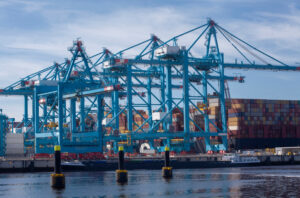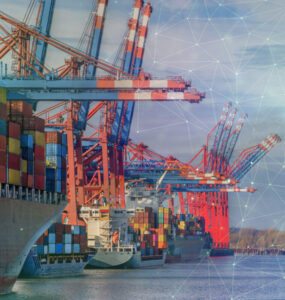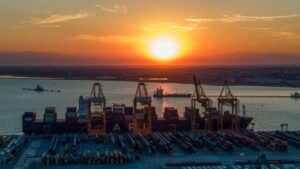These are the top ten terms that any international shipper dealing with sea containers, shipping containers, containership or shipbuilding should know. Learning about shipping terminology is essential when shipping goods around the globe.
Demurrage (DM)
Demurrage is a fee charged by container lines when your imported containers have not been picked up in time.
A charge relating only to the use of the equipment shall be paid by the merchant or the international shipper for the equipment of the carrier kept beyond the free time offered by the carrier for the delivery of goods to the port, terminal or warehouse.
Once an international shipper has been discharged, the port (provided by the container line) has a free period to store them. Before the free period expires, you must pick up your containers.
If not, the amount of days containers are left in the port will be charge to the international shipper.
Container shippers can also be charged for demurrage fees if they have containers that the container line can not ship because of customs issues, for instance.
The then can be charged to store your containers in the port for the amount of days.
Port Storage
They are shifted to a container yard when containers are discharged from a vessel.
The port offers a free storage period (not to be confused with the container lines free time demurrage).
International shippers have time to take care of customs clearance processes during this period and transport your products to a warehouse or final destination.
This is crucial for ports because space shortages can impact port productivity and trigger port congestion.
The port can charge for Port Storage if the shipper does not clear its products and transfer your containers in time.
International Commercial Terms (Incoterms)
The International Chamber of Commerce (ICC) is an internationally recognized set of trade term definitions.
The conditions describe a buyer’s and a seller’s trade agreement duties and liabilities.
For International Commercial Terms, Incoterms is brief. They are a sequence of pre-defined trade terms released by the Chamber of Commerce International.
The conditions are mainly designed to communicate obviously the duties, expenses and hazards connected with the carriage and distribution of products.
Since 1980, the International Chamber of Commerce (ICC), the largest, most representative business organization in the world, has been revising Incoterms at the turn of every decade.
As the end of the decade draws near, the shipping industry is getting ready to welcome a new version of Incoterms.
Container Yard to Container Yard (CYCY)
Container Yard is a location within a port or terminal where, in the event of imports, containers are stored before being loaded onto the vessel or discharged from the vessel.
The shipping word CYCY describes that on the container yard the carrier’s liability starts (loading port) and finishes (discharge port).
Detention (DT)
Detention is a charge you have to pay if international shippers have picked up your imported containers but have not returned them on time to the shipping line.
Contanerhsippers will then have to pay to return the containers for the extra number of days it took for you.
Containership operators can also be charged for demurrage fees if you have containers that the container line can not ship out because you have not returned them in time.
An international shipper will then have to pay for the additional amount of days in your ownership of the containers.
Change Of Destination (COD)
A Change of Destination (COD) is an application requesting the shipping line to discharge / transport the container to a location other than that specified in the Bill of Lading’s Port of Discharge or Place of Delivery areas.
A COD is requested for a variety of main reasons, including:
- The original purchaser withdrew from the contract and the seller found a new purchaser in another country while the shipment was on the water
- The contract between the purchaser and the seller was up to the Port of Discharge, but the purchaser now wants the shipping line to deliver the cargo at his expense and risk to his door.
Full Container Load (FCL)
Full Container Load (FCL)–as the name suggests, for those with bigger quantities of shipping cargo, who can use the room of a complete ISO shipping container.
With FCL international shippers have exclusive rights to the container and therefore the container will only ever contain your cargo, from the original packaging to the devan at the destination.
An FCL relates to one complete container load and it will be a product of price, time, fundamental product, transport technique, among many other components to decide whether to go for FCL or LCL.
For one designated consignee, as it will be the cargo; it could be any sort of item shipped from toys, commodities or equipment.
An instance of this is where a toy trader has a big order from a supermarket chain and instead of dividing orders and sending each one as part containers (by manner of LCL); the container shipper sends as one FCL and utilizes his own container for shipping all products. This implies that there is no sharing of room with other shippers.
Stuffing and Stripping
Containers can be stuffed and removed at all terminals by dedicated staff. Stuffing and stripping can take place either on quayside after shipment or straight in the container from the carrier.
Significant savings can be made in the latter scenario, especially when loading oversized cargo.
Container stuffing and stripping services are often extra services that are sought in a company’s Out of Gauge project cargo’s entire supply chain.
Bill of Lading
The Bill of Lading is a legal document given to a shipper by a carrier including details of delivery such as products type, amount, freight rate and destination.
It reflects the contract between the concerned parties and helps to ensure that exporters receive their payment and that importers receive their products.
The lading bill also serves as a receipt for the delivery.
Rollover
As a shipper, rolling your container is not completely unusual. When an ocean freight cargo is said to have been ‘ rolled, ‘ this implies that it was not loaded onto the ship on which it was intended to operate.
Occasionally, containers are rolled. This implies that the ship was not made by your container.
Due to customs issues, overbooking, or vessel omissions, your container may not be loaded onto the ship.









